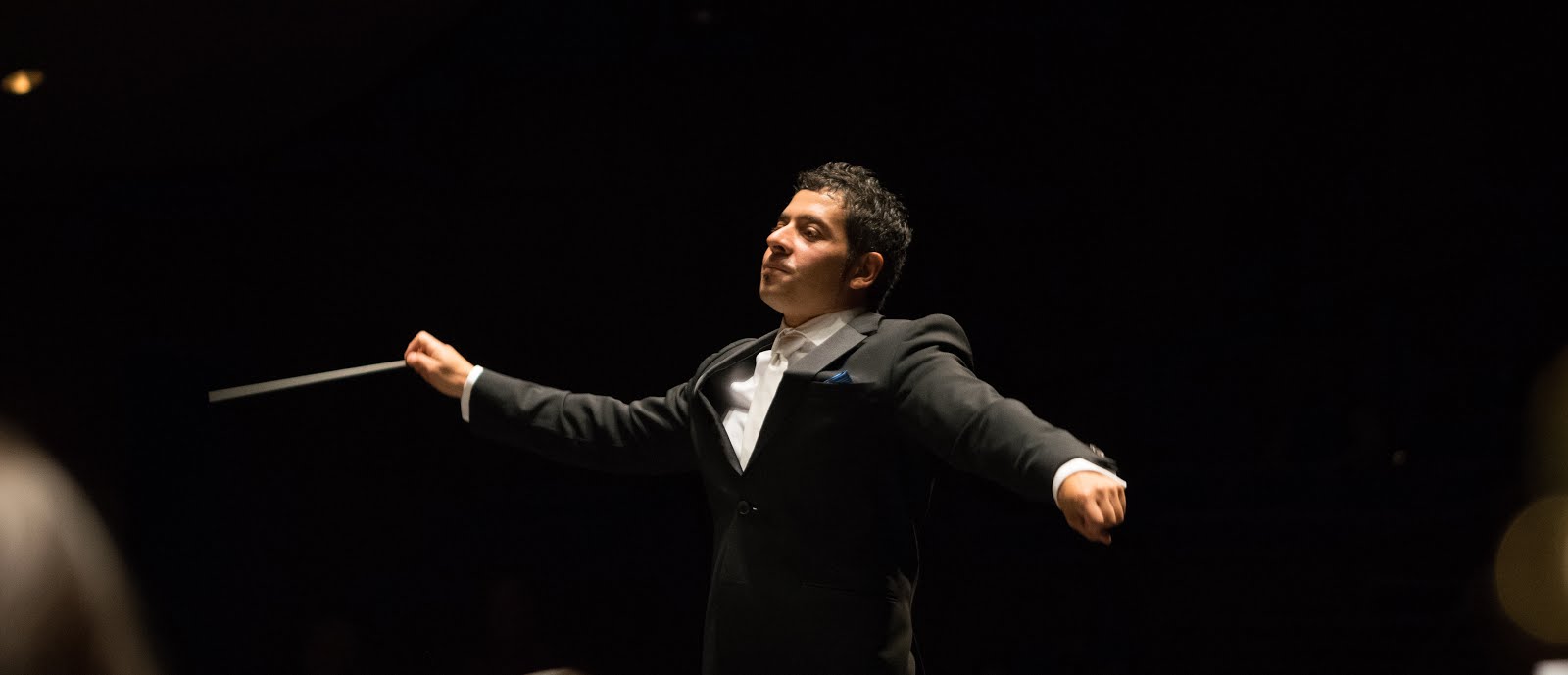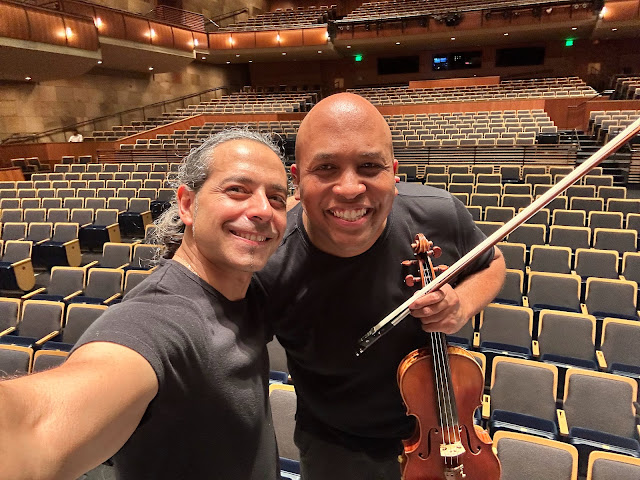Christian Baldini: Dear Kinga, it will be a pleasure to feature you as our soloist with the Camellia Symphony in Sacramento in Korngold's beautiful and unusual Violin Concerto, in a program that includes Shostakovich's Symphony No. 6 and the world première of a work by composer Trey Makler. What does this concerto mean to you, and what would you recommend for people to listen for?
Kinga Augustyn: It is a gorgeous work with lots of singing lines, oftentimes derived from Korngold’s film music, and with some violinistic acrobatics that are super fun to hear and watch! I would encourage people to check out some films such as “Another Dawn” or “The Prince and the Pauper” where we can hear the themes that Korngold later used in his awesome Violin Concerto. Then I would listen for them during the concert.
Korngold was an immigrant, like myself, and that automatically makes me understand many of the feelings and emotions in his music. Also, the concerto was composed after some initial persuasion of a great Polish violinist Bronisław Hubermann, who was also an immigrant. In fact there are quite a few connections here that make me feel very close to the piece. Above all, however, I just love it, and I cannot wait to perform it in a few days!
CB: You are an extraordinary violinist, with an international career, multiple recordings, and a true status as a virtuoso on your instrument. How did you get there? Who have been your most important mentors?
KA: Everything is always a build-up and a combination of choices and events in one’s life, not necessarily only music related. Consistency is important, as well as prioritizing things in order to avoid feeling overwhelmed and to actually get something accomplished. Constant growth is a must and is certainly possible.
My Juilliard teachers Mr. Cho-Liang Lin and Ms. Naoko Tanaka have definitely been among some very important figures in my life. Not only did I learn a lot from both of them that has benefited my violin playing and music learning, but they have also shaped some of my life journey.
CB: How was your childhood, growing up in Poland? You came to the US when you were 18 to study at the prestigious Juilliard School. How did your life change then? Was it difficult to adapt to a different culture?
KA: my childhood was great, although my father died when I was 6 and that complicated a couple things including that I could not start learning the violin till almost 8 years old. My mom, nevertheless, a strong and independent woman, made sure that I had all I needed to be content and to follow my dreams. I was always surrounded by music, art and books. I had the best violin that was available in my city (although, frankly, in the US it would be considered a low standard, but hey, a $500 fiddle that was the love of my life at that time and got me to Juilliard, got me scholarships and, indirectly, took care of me? Can’t go wrong with that! As a child I often attended master classes abroad and they were also very helpful to my musical growth. When I moved to the US I did face quite a lot of difficulties to adopt to a completely new life. Having been babysat by my mom for a long time, suddenly I was on my own, swimming in a big ocean and having to fight for myself! As they say “what doesn’t break you, will make you” so what did in fact break me first also helped me grow more than I would have grown otherwise. In New York there are many different cultures, and there is “everything”, meaning both good and bad, and one just really has to search for and find what one is looking for. Juilliard has a large community of international students, so I was not lonely or special in that regard. Without a doubt, however, it took quite some time to feel like I truly belonged somewhere, and I think it was only when I became American, fairly recently, that I, deep down, didn’t feel like an outsider any more. Now, a dual citizen, I feel good both in the US and anywhere in Europe. I belong where the music takes me.
CB: Thank you for sharing that. What are some works you have not performed yet, but that you would love to perform?
KA: There are many and the list is actually growing, as more music is constantly being composed, and many composers and great works are being rediscovered. Of the standard repertoire one of the great pieces I hope to perform in the upcoming years is the beautiful Samuel Barber Violin Concerto, and of the lesser known pieces are the seven Violin Concertos by Polish female composer Grazyna Bacewicz.
CB: What is some advice you would give to young musicians who are starting off on the violin? What would you say people can do when they feel frustrated or are on the verge of quitting?
KA: Well, if you absolutely hate it then quit! But there is a 99.9% chance that you will regret such a decision, as most people who quit do, so don’t quit just because it got hard. The truth is that it will always be “hard” in some ways, so get over it and accept the challenge. Studying violin or any other instrument will certainly always keep you occupied and on your toes, and will never be boring, if you really get into it. Realize how blessed you are to play music! And by the way, any other profession is also going to be difficult in one way or the other. The most important thing is to do what you love, so if you do love music, turn any frustration into motivation and go practice, go to a concert, if you need inspiration, and be happy. If you radiate happiness, you are making the world a better place, and what’s more important than people’s happiness?
CB: Thank you for your time. We look forward to featuring your remarkable talent with our audience in Sacramento!
KA: thank you Christian. I could not be more excited to make music with you and the Camellia Symphony Orchestra! See you soon!

Polish-American Kinga Augustyn is a versatile New York City-based virtuoso concert violinist and recording artist. “Stylish and vibrant” (The Strad Magazine), and “beyond amazing, one hell of a violinist!” (The Fanfare Magazine), Ms. Augustyn has performed as a soloist with orchestras in the United States, Europe and Asia, and they include the Roanoke Symphony Orchestra, Queens Symphony Orchestra, Catskill Symphony Orchestra, Deutsches Kammerorchester Berlin, Magdeburg Philharmonic Orchestra, the Chamber Orchestra Leopoldinum, and the Wrocław Philharmonic Orchestra. She has toured China and performed at China’s most prestigious venues such as Beijing Poly Theater and Shanghai Oriental Art Center. As a recitalist and chamber musician Kinga has appeared at the Stern Auditorium and the Weill Recital Hall at Carnegie Hall, Alice Tully Hall, The Metropolitan Museum of Art, The Aspen Music Festival, the Chicago Cultural Center, Teatro Ristori and Gran Teatro La Fenice. In addition to concerti with orchestras and recitals with piano, Ms. Augustyn frequently performs unaccompanied solo violin recitals and is also a member of the Baroque Virtuosity trio with lutist Christopher Morrongiello and harpsichordist Rebecca Pechefsky.
Kinga Augustyn is often praised for her musical interpretations, profundity, deft phrasing, beautiful tone, mastery of the bow, perfect intonation, and for unique programming ideas. “With completely secure technical control, she couples a tapestry of tone color to her innate musicality” (The Fanfare Magazine). Music Web International describes her recording of the Bruch Violin Concerto with Janacek Philharmonic as “extremely moving and expressive,” characterized by “beauty, richness and smoothness of her tone,” and as “music she responds to on a deeply personal and emotional level.”
Ms. Augustyn’s repertoire includes music both standard and lesser–known, stylistically varied and ranging from early baroque to contemporary. Kinga is an advocate of new music and has performed and recorded multiple world premieres of works written especially for her. She also researches and brings awareness to lesser-known composers, including those of her native Poland. Up to date, Augustyn has recorded three albums of Polish music. Grażyna Bacewicz: A Portrait was released in 2022 on Centaur Records. The other two albums, released on Naxos, are world premieres by the contemporary Polish composer Romuald Twardowski (b. 1930), recorded with the Torun Symphony Orchestra and Mariusz Smolij, and the Polish Violin Music, a highly praised, “fascinating” (The Strad) album of lesser-known Polish works.
In 2021 Augustyn released on Centaur Records Turning in Time, a critically acclaimed album featuring 20th and 21st Century unaccompanied solo violin works by Krzysztof Penderecki (world premiere of Capriccio), Debra Kaye (world premiere of Turning in Time), as well as other works, significant in the violin repertoire, by Elliott Carter, Luciano Berio, Isang Yun and Grażyna Bacewicz. Gramophone calls the album “remarkable” and praises Augustyn for “vibrant intensity, caressing the phrases and bringing bold focus to the electric unfolding of creativity”.
Augustyn’s expanding discography also includes the Paganini Caprices, which music critics consider as convincing as Perlman’s or Midori’s, and an “an enduring benchmark” (Classical Net); La Pasión, featuring 6 Tango-Etudes for Solo Violin by Astor Piazzolla; Telemann 12 Fantasias for Solo Violin (Centaur Records), in which “her interpretations are convincing in every piece here, and the Baroque spirit of the violin and Telemann’s mastery abiding throughout” (Music Web International); and Glen Roven’s Runaway Bunny Concerto performed with Catherine Zeta-Jones as a narrator and featuring Kinga Augustyn’s Solo Violin Cadenza (GPR Records).
Ms. Augustyn has won international awards, including First Prizes at the Alexander & Buono International String Competition (USA), Artist International Presentations (USA), and the J. S. Bach String Competition (Poland), as well as other top honors that include prizes at the Johannes Brahms International Competition (Austria), the Kloster Schoental International Young Artist Competition (Germany), Michael Hill International Violin Competition (New Zealand), and the Kosciuszko Foundation Wieniawski Violin Competition (USA).
Ms. Augustyn studied at The Juilliard School with Dorothy DeLay, Cho-Liang Lin, and Naoko Tanaka, and earned there both the Bachelor and the Master degrees as a full tuition scholarship recipient. She holds a doctorate from the Stony Brook University, where she was also awarded a full-tuition scholarship and assistantship and worked with Phil Setzer and Pamela Frank.
On a regular basis Kinga Augustyn plays a violin made by Joseph Gagliano in 1774, generously on loan to her from a private collector. When playing early music in a historically informed style, she plays Lukas Wroński’s uniquely designed violin inspired by the famed statue Venus de Milo.

.jpg)





.jpeg)
.jpeg)

